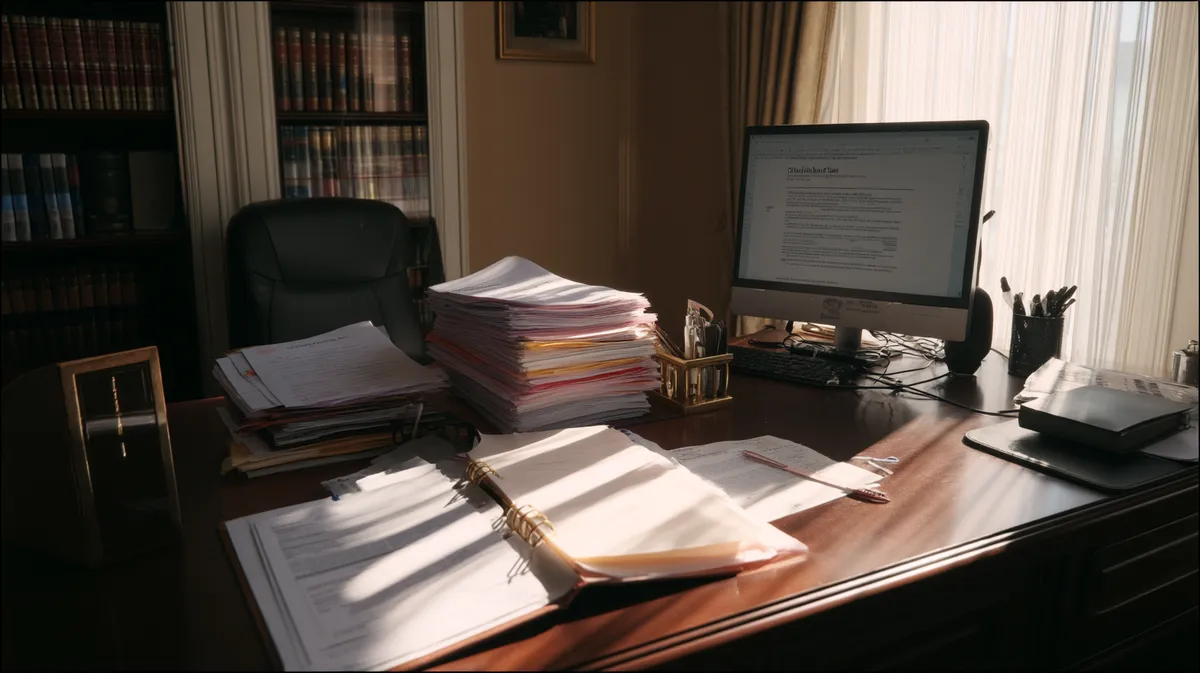Quick Answer
Every state sets its own clock for filing probate after a person’s death, and the range is wider than most families expect.
For example, in Nevada, anyone holding the will must get it to the county probate clerk within 30 days of learning of the death.
Texas gives an executor up to four years from the date of death to petition for probate. Wait longer, and you can lose the right to admit the will. California demands that the will reach the court within thirty days, while Florida’s custodian has only ten days to deposit the original.
Miss any of these deadlines and the probate court may refuse to open the estate, creditors can swarm, and heirs might battle over who should serve as personal representative.
The safest course: launch the probate process within six weeks of the funeral, even if the estate seems “simple.”
What Is Probate?
A Simple Explanation of Probate
Probate is the legal process in which the court validates a will (or confirms intestacy), appoints an executor or administrator, and oversees the transfer of a decedent’s assets to each beneficiary.
Because probate is a legal proceeding, everything from filing fees to creditor notices runs on courthouse schedules rather than family convenience.
Why Probate Is Necessary
Probate protects everyone’s legal rights.
It lets creditors file claims against the estate, ensures taxes are paid, and prevents an heir from raiding bank accounts before the court approves the distribution of assets.
Without court oversight, a disgruntled surviving spouse or distant cousin could block a sale of real property or contest who should manage the estate administration.
What Assets Go Through the Probate Process?
Only property that is solely in the decedent’s estate, think personal checking, a vintage car titled in just Dad’s name, or a cabin deeded to him alone, must go through probate.
Jointly held property, POD accounts, life-insurance proceeds with named beneficiaries, and some trusts bypass formal probate. The type of assets drives whether you file a full formal probate, use a small estate affidavit, or simply record new deeds.
Timeframe for Filing Probate
General Deadlines by State
Most states require filing probate “promptly,” but real rules range from days to years. Statutes often tie the deadline to lodging the will rather than filing the entire probate petition.
Where no fixed limit exists, courts still expect filing probate on time, usually within a few months, because delays jeopardize tax reporting and invite creditor claims.
What Happens If You Miss the Deadline?
Failing to file probate after death can void the will, force heirs to rely on intestacy, or let the court appoint someone other than the named executor.
In some states, a creditor or disgruntled heir can step in as administrator of the estate, add late-filing probate fees, and even sue the original executor on behalf of the estate.
Exceptions and Special Circumstances
States often waive strict timing when the estate includes only personal property, when the heirs sign consents, or when there is no need for estate tax returns.
A pending wrongful-death lawsuit or newly discovered oil royalty can also let you reopen probate years later, though that path is bumpy and expensive.
State-by-State Probate Filing Deadlines
Examples of Common Deadlines
Nevada: Thirty days to lodge the original will with the district-court clerk.
Texas: Four years from the person’s death to file the will and start probate.
California: Thirty days to deposit the will; probate may follow anytime, but earlier filing shortens the overall timeline.
Florida: Ten days for the custodian to lodge the will, though the probate case itself can be opened later.
Arizona: Two years after the decedent’s death to begin an informal probate; missing this window forces a more complex formal proceeding.
Utah: Three years from death to commence informal probate (or show an exception for “tardy” filings).
Where to Find Your State’s Specific Rules
Check your state’s probate code, the clerk’s website, or a reputable law firm guide. Each “probate court in the county” posts local forms explaining when to file a petition for letters or a small estate affidavit.
If that feels like alphabet soup, a seasoned probate lawyer can help translate deadlines into a practical probate timeline.
Who Is Responsible for Filing Probate After Death?
Role of the Executor or Personal Representative
The named executor, also called the personal representative, must gather the death certificate, locate the will, inventory estate assets, and file a petition for probate.
Until letters issue, the executor holds no power to touch bank accounts or sell real property, yet the court still expects prompt action.
What to Do If There Is No Will
When a person dies without a will, relatives may petition the court for letters of administration. If multiple people seek control, statute sets a priority ladder: surviving spouse, adult children, then creditors.
If no one qualifies, the court will appoint a public administrator.
Steps to Take Immediately After a Death
Gathering Important Documents
Start by locking down the paper trail. Grab ten certified death certificates, the will or trust, deeds, titles, recent bank and brokerage statements, insurance policies, and tax returns. Snap phone pics of everything so you’ve got a backup before stashing the originals in a safe or with your probate lawyer.
Notifying Beneficiaries and Financial Institutions
Next, get on the horn. Let heirs know what’s happening, then call each bank and broker to freeze withdrawals except for funeral costs. Alert credit-card companies, Social Security, insurers, and the decedent’s employer; closing accounts fast stops fraud and keeps bills from piling up while probate gets going.
Can a Probate Lawyer?
If the estate owns a business, farmland, or tangled personal property, a good probate attorney shields the executor from liability. Even straightforward cases can benefit from an hour of legal advice to map deadlines, especially when federal or state estate tax might apply.
How to File Probate
Overview of the Probate Filing Process
Filing kicks off with a verified petition asking the court to admit the will (or authorize intestate administration) and appoint you as personal representative.
You’ll pay the filing fee, post any bond the judge orders, and pick a first-hearing date, usually four to six weeks out in most states. At that hearing, the judge signs Letters Testamentary or Letters of Administration, which are the golden tickets letting you collect the decedent’s assets, retitle real property, and open a dedicated estate bank account.
From there, you’ll publish notice to creditors, mail formal notices to all heirs, and start logging every penny that flows in or out of the estate so you’re ready for the final accounting.
Required Documents and Information
Beyond the original will and certified death certificate, expect to file an affidavit of heirs, a proposed order, and an estimated value sheet listing everything from the decedent’s checking balance to the book value of the pickup truck. Some courts ask for a preliminary inventory right away; others give you sixty days.
If the estate holds firearms, mineral rights, or out-of-state timeshares, flag those early. Special title transfers can take months. Courts also want proof you mailed creditor notices, plus any bond riders if the judge required a surety bond to protect beneficiaries from mismanagement.
Timeline After Filing
Once letters issue, most states hold creditor claims open for 60–120 days.
During that window, you’ll inventory personal property, get real estate appraised, and file any required estate-tax returns. Simple estates with no debt can wrap shortly after the claim period closes, while ones with rental homes, lawsuit threats, or multiple brokerage accounts often need a year or more.
Before closing, you’ll file a final accounting, show receipts for every expense, and ask the judge for an order distributing what’s left to heirs. When that order is signed and recorded, the estate bank account zeros out, your bond releases, and probate is done.
Final Thoughts on the Probate Process
Importance of Acting Promptly
Delaying probate seldom saves money. Filing for probate quickly controls creditor claims, preserves property insurance, and keeps the IRS happy. Timely action also protects the right to be appointed as executor before a stranger steps in.
Resources for Guidance and Legal Help
State bar websites, clerk checklists, and nonprofit elder-law groups offer plain-English guides. When stakes are high, such as a federal estate tax return, a family cabin, or siblings who disagree, a competent probate lawyer can help you steer clear of pitfalls and keep the distribution of assets moving.
FAQ’s About the Probate Timeline
Yes, by using living trusts, TOD deeds, joint accounts, or by qualifying for small estate procedures where assets can be distributed via a small estate affidavit without court hearings. Still, some probate legal filing may be needed if a stray stock certificate surfaces later.
Most states demand lodging the original within ten to thirty days, though statutes like Texas’s four-year rule govern the broader filing window. Waiting risks extra fees and even the loss of the court’s blessing to act.
A sale is possible once letters are issued, but proceeds stay in the estate account until the judge signs the final order. Skipping that step can void the transaction and anger the title company.
You may need to reopen the case or file an ancillary petition, especially when unknown brokerage accounts or mineral rights appear.
Expenses like attorney fees come out of the estate before heirs collect. Good record-keeping lets the administrator of the estate prove every dime went to legitimate costs rather than personal spending.






